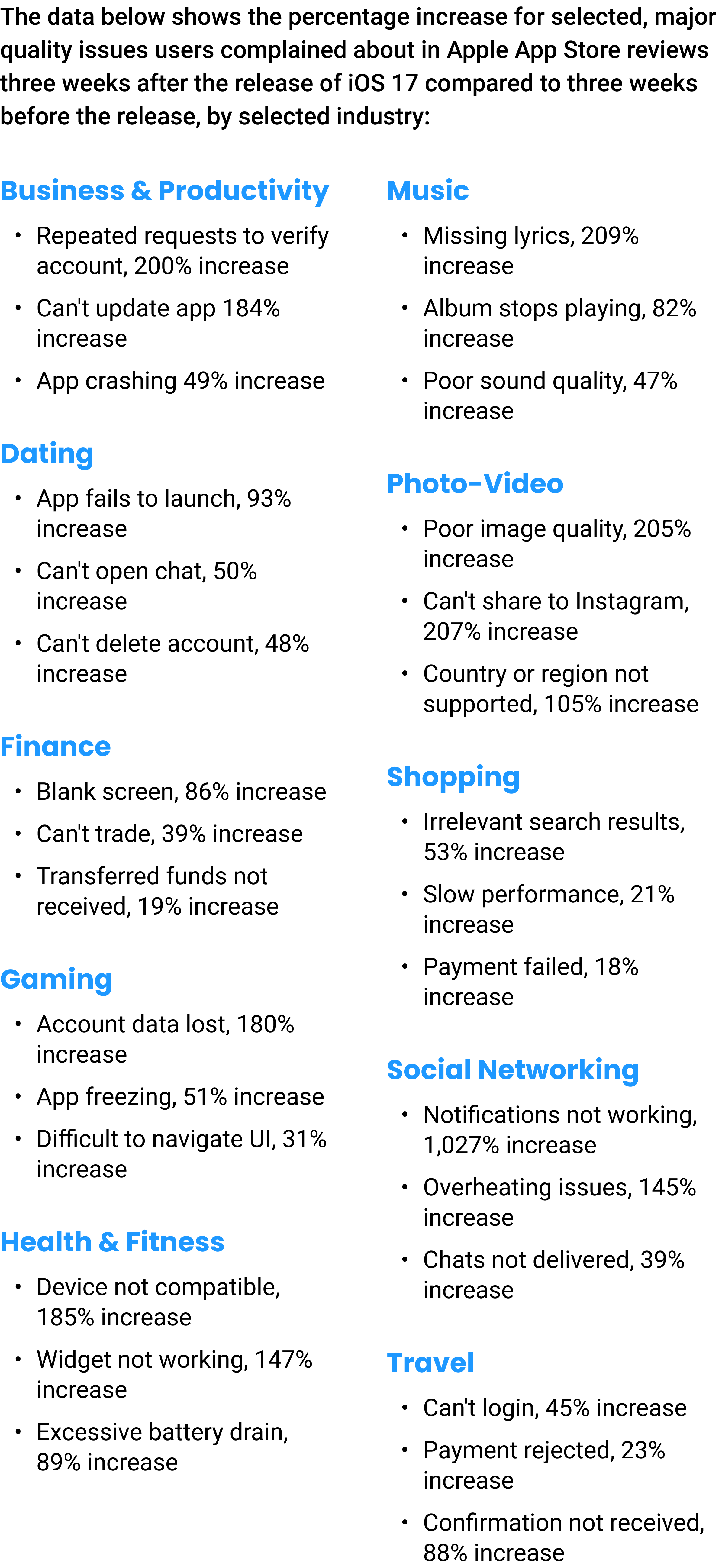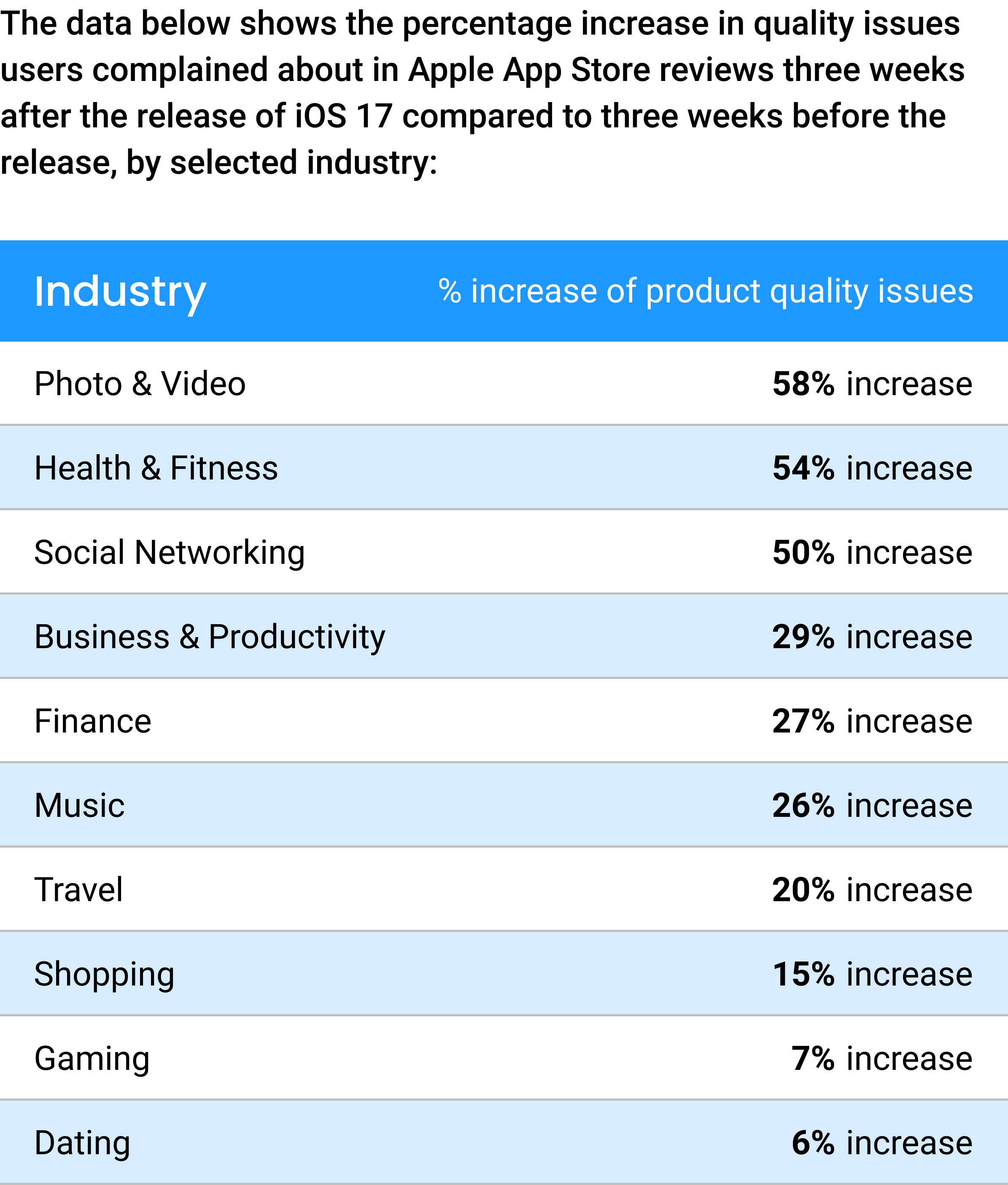iPhone users reported a 29% increase in issues with their mobile applications in the wake of Apple updating its operating system to iOS 17, according to a unitQ analysis of App Store reviews.
unitQ’s examination of App Store reviews following iOS 17’s release on September 18 found that applications from all industries were hit with major quality issues — user friction. Across the board, in each of the 10 industries we explored, applications suffered a jump in generic issues like app crashing and blank screens. In addition, there was also a substantial increase in the volume of user-identified issues specific to an app’s industry.
For example, music applications saw a massive spike in users complaining about missing lyrics. Shopping apps were hit with a jump in user complaints about irrelevant search results. Overheating and notification issues were a big concern for social networking apps. And users were frustrated a lot more about fund transferring with finance apps after iOS 17 than before the update. The list goes on….
Quality issues despite iOS betas
It’s worth noting that these destructive quality-of-life or customer-churning issues we’re highlighting occurred despite the release of public and developer betas months ahead of the iOS 17 update. And we reached a similar conclusion after the release of iOS 16 and iOS 15.
*For more on the issues associated with the iOS 16 update, read the unitQ study here.
*For more on the issues associated with the iOS 15 update, read the unitQ study here.

Our analysis
unitQ ingested Apple App Store reviews of more than 5,000 top iOS applications. We then parsed those reviews with machine learning and proprietary unitQ algorithms to produce these results.
Our studies are based on unitQ proprietary AI and machine learning models that are at the heart of our Quality Automation platform that provides our customers with AI-powered, actionable insights from user feedback to help them craft high-quality products, services and experiences. unitQ AI has the capability to centralize feedback from all feedback sources and parse it into thousands of granular categories to empower product builders, engineers, support leaders and team members to understand user feedback in real time to build superior products, fix bugs faster and resolve support issues at scale.
Details of study
To further refine the results of this study, we removed all applications from our analysis that did not receive at least 100 pieces of user feedback during the study’s six-week period
— the three weeks before to the three weeks after the release of iOS 17. As a result, that left us with 998 applications in the 10 verticals we selected to investigate.
Altogether, unitQ AI analyzed 1,260,262 pieces of user feedback in the six-week period (587,754 prior to the iOS 17 launch and 672,508 post launch). Our AI automatically removed the user reviews in which no quality issue or user friction was found. In the end, unitQ’s AI systems detected a 29% increase in the number of quality issues in the three-week aftermath of iOS 17 compared to the same time period before the iOS 17 update.
Industry friction at a glance
In every industry our study examined, quality issues jumped, with the Photo & Video, Health & Fitness and Social Networking verticals seeing at least a 50% increase. Other industries like Dating, Gaming and Shopping saw the smallest increases, 15% or less.

The takeaway
unitQ’s artificial intelligence highlighted a 29% increase in issues across different application categories post the iOS 17 update. Despite the availability of public and developer betas prior to the iOS 17 release, notable quality-of-life, user friction issues emerged — echoing similar scenarios with the previous iOS 16 and iOS 15 updates. Through utilizing AI and machine learning, unitQ was able to categorize and quantify these quality issues, illuminating the persistent challenge for developers in ensuring a smooth transition to new iOS versions, and emphasizing the critical role of continuous quality monitoring and user feedback analysis in delivering superior app experiences.
About unitQ
As the leading Quality Automation platform, unitQ empowers companies with AI-powered, actionable insights from user feedback to help them craft high-quality products, services and experiences. unitQ centralizes feedback from all sources and automatically groups it into thousands of granular categories to help organizations discover what matters most to users — all in real time. Category-leading companies like Spotify, Bumble, Pinterest, Udemy and HelloFresh rely on unitQ to drive growth, reduce churn and build brand loyalty.
With unitQ customer feedback software, including unitQ GPT, you can discover quality issues at the same time as your users. Know what product launches, releases or evergreen features are causing the most bugs or support tickets. Drill into the root causes of these issues by source, platform, device, customer segment and more.
Want to see how your organization compares to others? Get your free unitQ Score or book a unitQ demo today!
Follow unitQ on LinkedIn and X.
Lance Miles is Senior Data Engineer at unitQ. David Kravets is Senior Content Marketing Manager at unitQ



